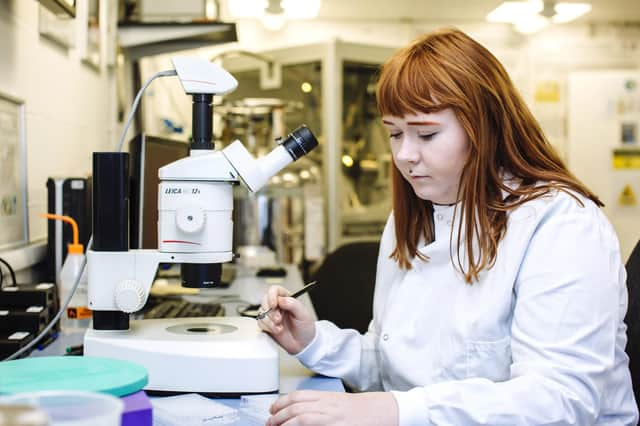‘We urgently need to translate the science from the laboratory to the recycling industry' - UoP researchers recognised


The Uop’s Centre for Enzyme Innovation (CEI) team have been focussing on engineering enzymes that can recycle single-use plastics and textile waste.
Highlighted in the strategy as ‘empowering local pockets of excellence to reach global markets’, the EI is expanding research and innovation as an internationally recognised hub for collaborative networks in this space.
Advertisement
Hide AdAdvertisement
Hide AdSince its conception in 2019, the CEI has been delivering transformative enzyme-enabled solutions for the circular recycling of plastics.
During the last year it has been accelerating research which can take these enzymes to the next level of recycling at scale.
The jump from the laboratory to real-world applications requires an approach that combines state-of-the-art facilities, exceptional researchers and, crucially, close collaboration with government, business and key research institutions across the UK.
Professor Andy Pickford, Director of the CEI, said: “From plastic bottles, single-use packaging, and the mountain of textiles that is accumulating worldwide, we urgently need to translate the science from the laboratory to the recycling industry.
Advertisement
Hide AdAdvertisement
Hide Ad"Our new custom bio-recycling facilities at the CEI have allowed us to target the questions that really matter to the industries that produce, use and recycle plastics, all of which desperately want solutions to meet their ambitious sustainability goals.
“The future health of our planet depends on how we manufacture, use, reuse, and recycle our most common materials.
"The production volume of plastics is expected to increase over the next decade, in part due our appetite for low cost, high-performance materials, but also as a result of the switch to electrification, and the resulting reduction in demand for fossil-based fuels.
“In order to develop solutions that will reach the market, we need to address the questions that businesses are asking about the latest recycling technologies: ‘How much energy is required?’; ‘What amount of greenhouse gases are emitted?’; ‘How much will it cost?’; and ultimately, ‘How circular and sustainable is the process?”
Advertisement
Hide AdAdvertisement
Hide AdResearch England provides funding and long-term strategic direction to English universities for research and knowledge.
It supports university staff, research students and infrastructure critical to making high-quality research and knowledge exchange possible.
Professor Pickford added: “We’re delighted to have the CEI recognised in the forward-looking Research England Strategy, cementing our role as a centre of excellence, and as a central hub for academic-industry partnerships in the circular economy of plastics.”
Dr Steven Hill, Director of Research at Research England, said: “I am delighted to see the continued development of the Centre for Enzyme Innovation, following the award of funding in the first round of Research England’s Expanding Excellence in England programme.
"The Centre’s research is hugely important in addressing the challenges of dealing with waste from single-use plastics and textiles.”